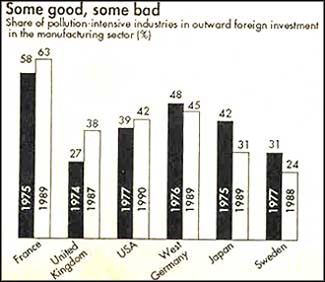UN gives MNCs a clean chit
 CONTRARY to what environmentalists may think, a prestigious United Nations report -- the World Investment Report (WIR), 1992 -- has virtually given a clean chit to multinational corporations (MNCs). It says there is very little evidence to show that MNCs shift environmentally dangerous industries to poor countries. But not all UN reports take this position. A WHO report (see Down To Earth, June 30) had complained that large amounts of hazardous wastes were dumped in developing countries by industrialised countries. A study in South Korea found that foreign companies there were applying emission control measures which were less stringent than in their home countries.
CONTRARY to what environmentalists may think, a prestigious United Nations report -- the World Investment Report (WIR), 1992 -- has virtually given a clean chit to multinational corporations (MNCs). It says there is very little evidence to show that MNCs shift environmentally dangerous industries to poor countries. But not all UN reports take this position. A WHO report (see Down To Earth, June 30) had complained that large amounts of hazardous wastes were dumped in developing countries by industrialised countries. A study in South Korea found that foreign companies there were applying emission control measures which were less stringent than in their home countries.
Though the WIR accepts the extensive involvement of MNCs in pollution-intensive and hazard-intensive industries, and the fact that "MNCs have greater leverage (than domestic firms) in negotiating favourable environmental regulations, permits and exemptions with host countries", it argues that it is "not easy to evaluate the impact of MNCs on the environmental quality in host countries."
MNCs are widely involved in hazardous industries. They are the primary producers and intermediate consumers of chlorofluorocarbons (CFCs) that are mainly responsible for stratospheric ozone depletion and account for at least 15 per cent of greenhouse gas emissions. E I Du Pont de Nemours and Co alone accounts for 25 per cent of the world production of CFCs. The 20 largest international pesticide manufacturers accounted for 94 per cent of the world's agrochemical sales in 1990.
The share of pollution-intensive industries (namely chemicals, pulp and paper, petroleum and coal products, and metal industries) in foreign direct investment (FDI) in the manufacturing sector was 20 per cent to 50 per cent in developing countries and 30 per cent to 60 per cent in developed countries. This share declined in developing countries in the 1970s but increased in the 1980s. An opposite trend, however, was seen in the developed countries.
The report claims that developing countries seem to be becoming greater suppliers of pollution-intensive products in world trade. Between 1975 and 1988, developing countries increased their share of pollution- intensive products in world trade from 17 per cent to 22 per cent. The UN could not find any information to attribute that shift to either MNCs or domestic firms.
Are stronger environmental regulations in the North forcing MNCs to relocate dirty industries to the South? Says the study: "Evidence of industrial relocation does exist in certain industries (for example, asbestos, heavy metals and leather tanning), but the balance of the research suggests that environmental cost differences have not been a major determinant of FDI, and that major shifts through FDI have not occurred because of differences in national standards." It quotes a study on "pollution havens" in Asia, which concludes that the growth of pollution-intensive industries in the region was not the result of an environmentally-induced relocation -- "rather, it was market expansion that explained the growth of such industries".
Do MNCs adopt lower environmental standards in developing countries than in developed ones? Two Asian studies have found this to be true, but the UN report adds, "they maintained a better track record in environmental management than local firms, using their superior technological, financial and managerial resources." The report concludes: "(One) characteristic of MNCs that bears on their environmental performance is their relatively greater visibility and vulnerability... MNCs are guests in the host country and, compared to local firms, often must strive harder to maintain good relations with host governments and local communities... MNCs are more open to closer scrutiny by national politicians and journalists than domestic firms, and tend to respond faster when asked to correct environment problems."
These are glorious words. The WIR, coming from an organisation that, until recently, wanted a code of conduct for MNCs, should be a matter of great pride for them. But, as one UN observer points out, it is hard to say whether the report reflects the changing behaviour of MNCs or the changing politics in the UN.
